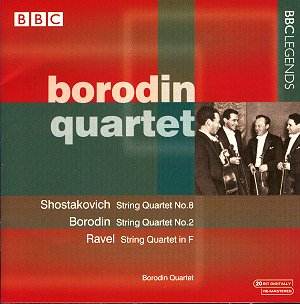I must confess to a frisson of expectation when
this disc dropped on the doormat. This is a wonderful programme of three
masterworks of the string quartet medium (taken from two concerts just
days apart), played by one of the truly great quartets of our time.
I had great hopes.
The Shostakovich and Ravel came from a concert given
on August 31st, 1962. The Borodin Quartet’s association with the music
of Shostakovich is the stuff of legend (a complete cycle at the Barbican,
albeit with an adjusted line up given the distance in years from these
recordings, was simply stunning), and it will come as no surprise that
the Eighth Quartet comes off best. There is high drama in the third
movement, which contrasts with and emphasises the expressive and hushed
fourth movement. But there are surprising technical slips, too, and
the impression surfaces from time to time that the hubbub of the Edinburgh
Festival may well have disturbed the quartet’s concentration. True,
live performance brings with it various advantages, and the second movement,
Allegro molto, is riveting; but the quartet nevertheless consistently
fails to get beneath the skin of this enigmatic music.
The account of the Ravel continues the rather uneasy
mix of moments of beauty and insight juxtaposed with slips of concentration
and tuning (Dubinsky goes decidedly off the centre of the notes towards
the end of the first movement, for example). Nevertheless, the ‘Assez
vif’ attains a sense of mystery and in the third movement, around 3’20,
the first moment of real hushed magic appears. Curious, then, that despite
great tonal variety in the finale, the ending itself is careful, rather
than bathed in a ‘throw-away radiance’. As in the Shostakovich, the
recording does not help (listen to the muffled cello in the second movement).
Try the Quartetto Italiano on EMI References (CDH5 74792-2, coupled
with the Debussy and Milhaud’s Twelfth Quartet review)
for a performance which gets closer to the heart of this piece.
Two days earlier, the Borodin Quartet gave a performance
of Borodin’s ever-popular Second Quartet. As in the rest of the disc,
the sound is harsh and grates (sometimes it is just plain uncomfortable).
Strangely, it is almost as if this fits the interpretation, which is
grittily determined and unwilling to relax. One feels this straight
away, and it runs through the taut Scherzo. But it is the famous Notturno
that suffers the most: despite moments of beauty, it simply refuses
to settle down.
Even great quartets have off days, and it does rather
seem that this disc represents two of them. Disappointing.
Colin Clarke


